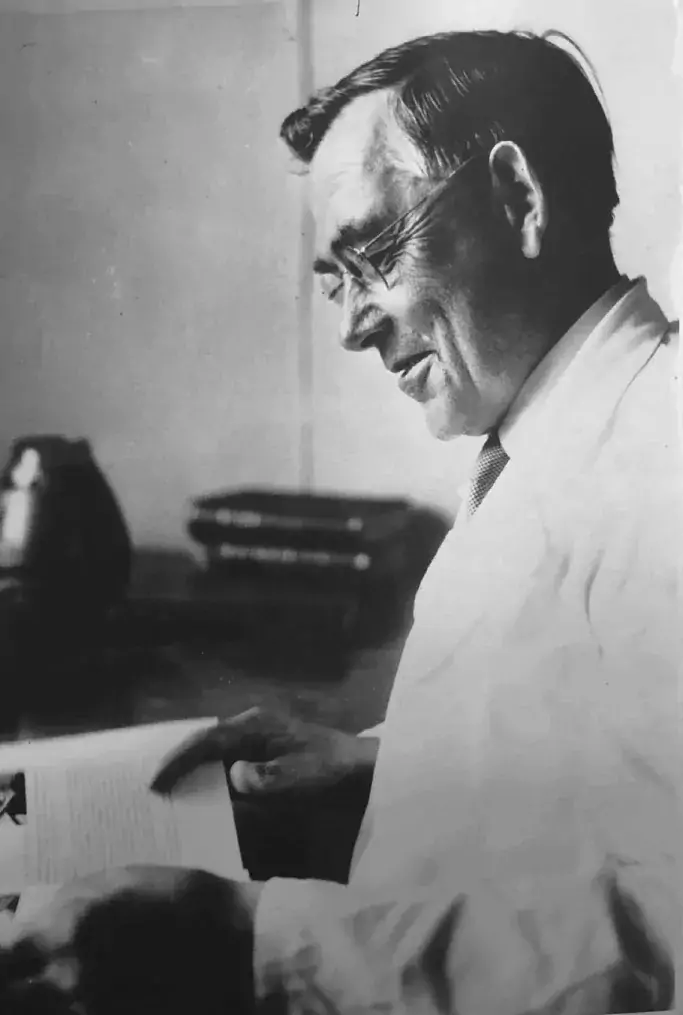Erik Jorpes (1894 -1973)
Erik Jorpes was a physician and professor of medical chemistry at Karolinska Institutet. Erik Jorpes was born on the barren rock of an island called Kökar, in the Åland archipelago. His family eked out a living as fishermen. The early discovery of a head for academic studies alone slated him for a different life. However he never forgot the repetitive humiliation of making the rounds among the Helsinki upper class bourgeoisie, grades in hand, to secure continued funding for his studies.

In his twenties the medical student Erik Jorpes has turned to Communism, and as such he participated on the Red side in the 1918 civil war. He later arrived in Sweden as a political refugee, according to his own statements on the matter with prison sentence pending in his native Finland. A Royal dispensation was worked out to allow young Jorpes to finally obtain his medical degree. He was then accepted as a PhD student at Karolinska Institutet chemistry department, with its “Laborator” Einar Hammarsten as his supervisor. Hammarsten was himself married into Swedish speaking community in
Finland, and had been impressed with the young man’s grades in chemistry back in Finland; a wholly exceptional Eximia cum laude approbatur (pass with exceptionally great merit).
It is unconfirmed if he had to personally promise the Swedish Social Democratic Prime Minister Hjalmar Branting to lay off politics in the future in order to garner permission to be admitted to the KI, but we know that henceforth he stuck to his scientific research in lieu of politics. In 1928 he presented his PhD-thesis in Hammarsten’s particular field of research, the nucleic acids (DNA and RNA today). The very same year, as Hammarsten accepted the professorial chair in chemistry, Erik Jorpes obtained the senior research position of Laborator at the department.
As part of the program of massive expansion of academic positions embarked on by the Swedish government in the euphoria after the end of the Second World War, Erik Jorpes was very deservedly elevated to professor of medical chemistry at Karolinska Institutet, a position he held until his retirement in 1963.
With his fresh PhD Erik Jorpes had spent a year on the Rockefeller Fellowship at the Rockefeller Institute (today University) in New York, that bastion of Capitalism, where he studied the structure of heparin, and its role in the blood-clotting process. He eventually published his results in 1935, and became the first chemist to produce chemically pure heparin, a precondition for effective use of the substance in controlling bleeding during, and after, surgery, as well as the manufacture of anti-clotting drugs.
In the 1940’s Jorpes formed a successful partnership with the KI professor in thoracic surgery, Clarence Crafoord (first successful case of open heart surgery in 1944). The heparin reduced the risk of post-operative blood-clots. The Swedish pharmaceutical company Vitrum based on Jorpes work in 1936 launched heparin commercially for intravenous use, an event often described as the advent of the first Swedish original drug. Until this time drugs had been manufactured only on license from the dominant German pharmaceutical industry.
Aside from heparin, Jorpes also worked on insulin. This research coupled with Jorpes contacts in the pharmaceutical industry, and knowledge of industrial processes, during World War II made him ideallu suited for the government appointed task of making Sweden self-sufficient in insulin production. As one among the many exquisite paradoxes of his life, he eventually became a very wealthy man, money he in turn largely invested in the research of others. His students and charges number among other Sune Bergström, Hammarsten’s successor as professor of chemistry at the KI, and Nobel Prize Laureate in 1982 (prostaglandins), and the hematological researchers Birger Blombäck and Meta Blombäck (hemophilia drugs).
Jorpes was elected fellow of the Royal Academy of Science in Stockholm in 1945. In 1950 he received the Stockholm Royal Institute of Technology’s (KTH) great prize. He also received an honorary doctorate at the University of Turku (Åbo Akademi). He cultivated a keen intrest in the history of chemistry, and among other things published a number of biographical and historical articles on the great Swedish 19th century chemist Jacob Berzelius.
Text: Olof Ljungström, Unit for medical history and heritage, Communications and public relations office
